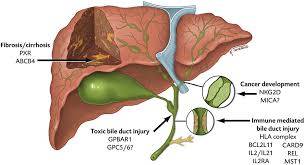Primary sclerosing cholangitis (PSC) is a rare liver disease characterized by inflammation and scarring of the bile ducts. Here are 20 potential factors related to PSC, along with signs and symptoms, effects, and solutions:
**Causes:**
1. Autoimmune disorder.
2. Genetic predisposition.
3. Environmental factors.
4. Family history of autoimmune diseases.
5. Inflammatory bowel disease (particularly ulcerative colitis).
6. Genetic mutations (e.g., HLA-B8 and DR3 genes).
7. Viral infections (possible association).
8. Bacterial infections.
9. Gastrointestinal conditions.
10. Smoking tobacco.
11. Toxins and pollutants.
12. Medications (some may be associated).
13. Chemical exposure.
14. Inflammatory processes.
15. Hormonal factors.
16. Microbial factors.
17. Immunological factors.
18. Infections or triggers in genetically susceptible individuals.
19. Stress and emotional factors.
20. Geographic and ethnic factors.
**Signs and Symptoms:**
1. Fatigue.
2. Itchy skin (pruritus).
3. Jaundice (yellowing of the skin and eyes).
4. Abdominal pain and discomfort.
5. Unexplained weight loss.
6. Chills and fever.
7. Enlargement of the liver.
8. Splenomegaly (enlarged spleen).
9. Elevated levels of liver enzymes.
10. Hyperlipidemia (elevated blood lipids).
11. Cognitive changes.
12. Bone and joint pain.
13. Pancreatic dysfunction.
14. Hypothyroidism.
15. Renal problems.
16. High cholesterol levels.
17. Increased susceptibility to infections.
18. Hematological abnormalities.
19. Gastrointestinal disturbances.
20. Bacterial cholangitis (infection of the bile ducts).
**Effects:**
1. Progressive scarring and narrowing of bile ducts.
2. Liver damage and cirrhosis.
3. Impairment of liver function.
4. Malabsorption of fat-soluble vitamins (A, D, E, K).
5. Metabolic complications.
6. Bone and joint pain.
7. Increased risk of infections.
8. Cognitive and mood changes.
9. Increased risk of gastrointestinal cancers.
10. Pancreatic dysfunction.
11. Sicca syndrome.
12. Impaired quality of life.
13. Impairment of renal function.
14. Increased healthcare costs.
15. Reduced life expectancy.
16. Increased risk of complications during surgery.
17. Social and relationship issues.
18. Impaired bone health.
19. Impaired fat metabolism.
20. Hematological and thyroid issues.
**Solutions:**
1. Early diagnosis and medical evaluation.
2. Medications to manage symptoms and slow disease progression (e.g., ursodeoxycholic acid).
3. Supportive care for managing complications.
4. Management of bone health (calcium and vitamin D supplements).
5. Lifestyle changes, including a healthy diet and exercise.
6. Support from healthcare professionals.
7. Psychological support and counseling.
8. Support from family and friends.
9. Support groups for PSC patients.
10. Regular medical monitoring.
11. Vaccinations to prevent infections.
12. Managing cardiovascular risk factors (e.g., cholesterol levels).
13. Monitoring for cancer and managing cancer risk.
14. Educational programs for healthcare professionals.
15. Public health initiatives to promote awareness.
16. Legal regulations and policies to reduce toxin exposure.
17. Avoiding alcohol and certain medications.
18. Smoking cessation.
19. Stress management techniques.
20. Liver transplant evaluation for advanced cases.
Managing primary sclerosing cholangitis typically requires ongoing medical care, lifestyle adjustments, and treatment for complications. If you suspect you have PSC or are at risk, consult a healthcare professional for evaluation and guidance.



No comments yet
Be the first to share your thoughts!